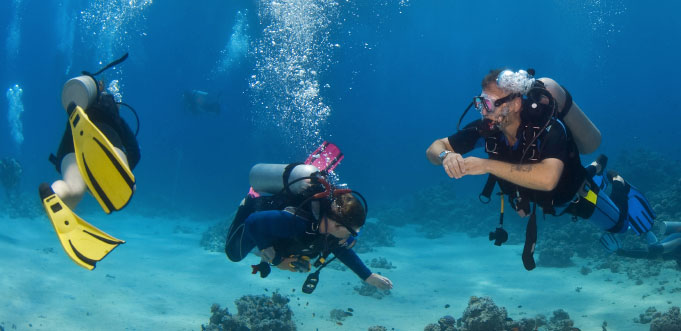I have encountered all of these, both as a recreational diver and as a dive professional. Diving with a good dive master can make the difference between a bad dive experience and a good dive experience. This is true whether you are brand new to our sport or a seasoned expert with thousands of dives.

A good dive master (DM) has to be a good diver, with good scuba gear that is well maintained. S(he) is knowledgeable about the dive site and the conditions at the site. A good DM also communicates information clearly to the group. A good DM will learn all (s)he can about the divers (s)he will be with in the water. When leading a dive, a good divemaster always asks first for a show of hands of those who have previously been to the dive site, and make note of it. By engaging each diver briefly before the dive and observing them setting up gear as well as the condition of their gear, the DM can get a fair idea of each diver’s level of comfort and competence.
A good DM will also ask divers about their expectations for the dive- photos, video, hunting, observation, and so on. When there are expert divers aboard, the DM should ask them if they want to do their own profile, something that is usually ok (depending on the site and conditions), especially if there is a person with current professional credentials and insurance in their group. It is helpful if these experienced divers tell the DM what they expect and want, and, if they intend to stray from the group, how the DM will know. This invariably works out well for everyone. That’s because part of being a good DM is knowing who needs close attention and knowing who does not. A good DM will do all of this with a pleasant and helpful attitude.
There are many things a recreational diver can do to help make your DM a better DM. Following these suggestions may well minimize the chance that you will have a “bad dive master” experience.
1. Pay attention to the briefing. Don’t be talking, fidgeting with cameras or gear, or using the head. If you have a question, ask it.
2. Tell the DM about any limitations or anxieties you have, whether about depth, current, waves, animals, or who your buddy is. The DM and boat crew can most likely resolve a problem or issue if they know about it.
3. Tell the DM the truth about your experience and competence level, and recent dive history.
4. If you didn’t know your buddy before the dive, talk with him or her and share experience levels and expectations for the dive. Get familiarized with each other’s gear.
5. Once the dive party gets in the water, unless it was previously agreed otherwise with the DM, follow the planned dive profile and stay reasonably close to the DM and the group.
6. Stay close to your buddy all the times.
7. Check where you are in relationship to the DM and the group on a regular basis. If you have strayed, catch up.
8. Communicate clearly and accurately about air supply if the DM asks you. Don’t conceal or ignore a low-on-air situation.
9. Between dives, let the DM know if you had a problem or complaint. Get it resolved before the next dive.
10. Ask for help if you need it, above or below the water.
The fact is there are some bad DMs, and there are good DMs who have a bad day now and then. So help them out by listening, communicating, getting acquainted, and following these suggestions. If your DM is not responsive, make the best of it, and tell the other crew members or supervisors about any issues. If you are diving with a DM, help them to help you have a good dive experience. DMs really do want to have happy divers. Happy divers leave nice tips.
Divemaster Dennis

